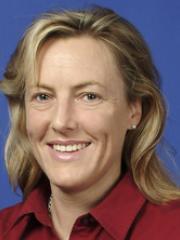Professor Gabrielle Belz

Overall goals
Our work aims to understand how the immune system responds to infections including viruses, bacteria and parasites.
We are elucidating how different types of immune cells develop, and what factors influences their decision to become one type of immune cell or another.
Understanding how the body deals with pathogens will give clues about how to enhance protective immunity. Our goal is to discover new therapies that boost our immune system to protect against infection.
Research interests
Cell differentiation is the process by which cells develop and mature. In this process, cells become more specialised and acquire potent effector functions that allow them to eliminate infectious organisms. There is an urgent need to develop new therapies that focus on augmenting host immunity.
Our research focuses on:
- Elucidating the mechanisms responsible for the generation of protective immunity in response to lung and gastrointestinal pathogens
- How protective immunity breaks down in chronic overwhelming infections
- Identifying factors that can promote host immune responses and potent long-lived protective immunological memory.
We have developed and use a number of in vivo models of infectious diseases including:
- Influenza
- Herpes virus
- Lymphocytic choriomeningitis virus (LCMV)
These models provide us with an unprecedented opportunity to examine the mechanisms that these pathogens employ to infect hosts and elicit immune protection or to subvert the host responses. Using a variety of approaches including multiparameter flow cytometry, systems biology and global gene expression profiling we aim to define cellular and transcriptional pathways in normal memory T cell differentiation, innate immune cell subsets and immune failure.
Researcher biography
Gabrielle Belz originally trained in veterinary medicine and surgery and received her PhD in understanding the organisation of lymphatics and lymphoid tissues at The University of Queensland. After a short stint in Canada to work on B cells, she moved to St Jude Children's Research Hospital to work with Peter Doherty supported by an NHMRC CJ Martin Fellowship. Here she established a number of systems that now allow tracking of virus-specific T cells and established the paradigm changing notion that CD4 T cell help was required for generating antiviral responses. She returned to The Walter and Eliza Hall Institute of Medical Research and uncovered the identity of the key dendritic cells necessary for initiating antiviral infections. Subsequently she was awarded the Burnet Prize and NHMRC Elizabeth Blackburn Fellowship. Her research contributions have been recognized by a number of awards including a Wellcome Trust Overseas Fellowship, HHMI international fellowship, ARC Future fellowship, Doctor of Veterinary Science and the Gottschalk Medal (Australian Academy of Science). Her laboratory focuses on deciphering the key cellular and transcriptional signals of protective immunity particularly by T cells and in understanding how innate immune cells develop and make novel contributions to mucosal immune defence.
